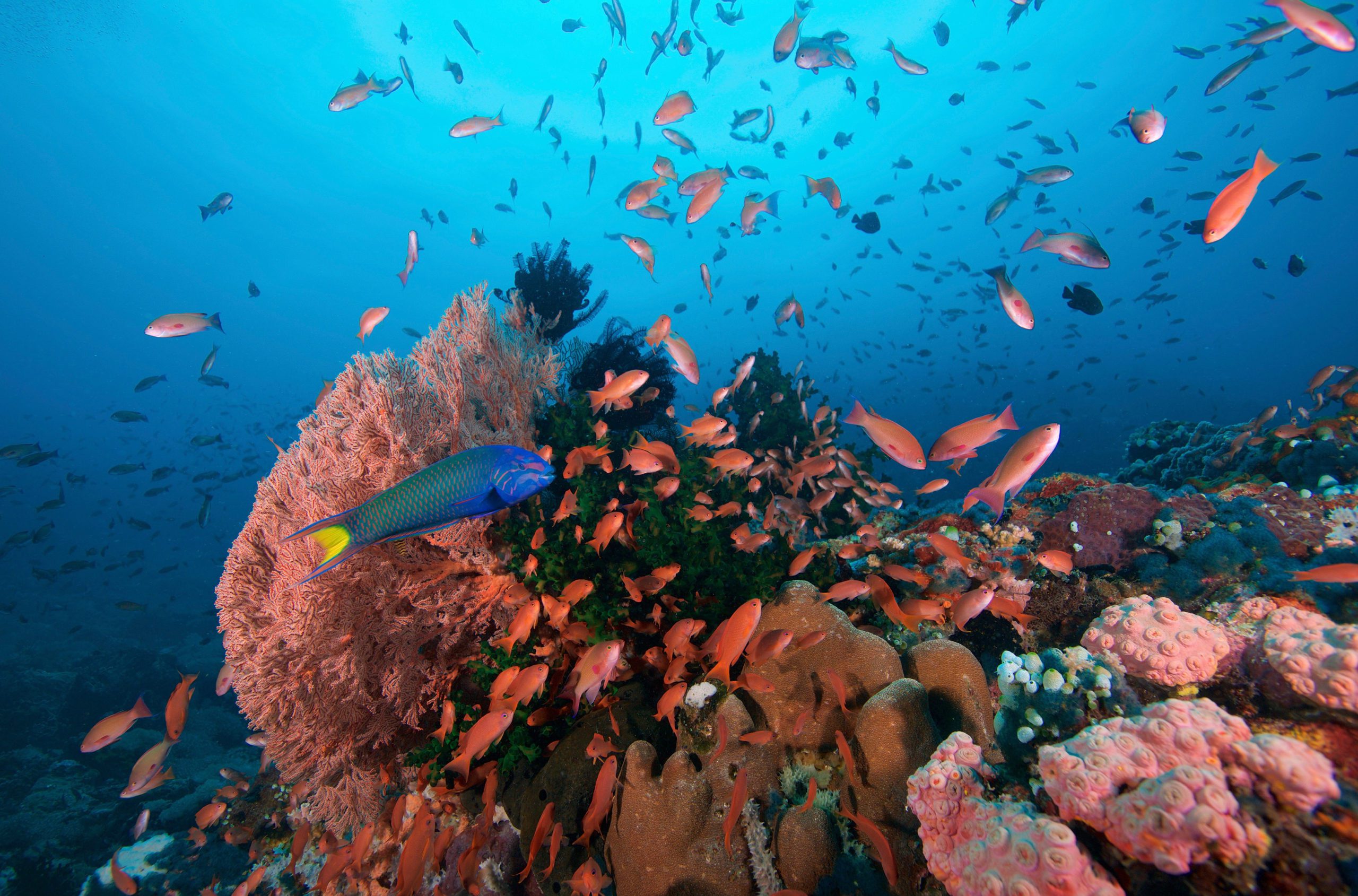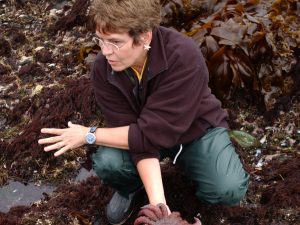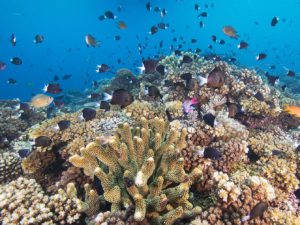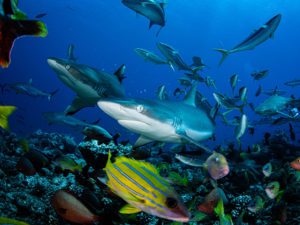Our Shared Seas checked in with Justin Kenney of the newly created ocean program at the United Nations Foundation to learn where there are still opportunities for the ocean community to recapture its momentum for what was to be the year of the ocean.
At the start of the year, experts throughout the ocean conservation field were touting 2020 as the most important year for the world’s ocean in our lifetime. Riding on the momentum of the “Blue COP” – held in Madrid in late 2019 – advocates and policymakers alike were inspired to move forward with a clear sense of what was at stake for people and nature. In its draft post-2020 framework, the U.N. Convention on Biological Diversity has proposed a target of protecting 30 percent of the ocean by 2030. These and other global meetings were poised to create promising action for the ocean.
The pandemic put many of those plans on hold as organizations canceled or rescheduled meetings. But despite these delays, threats to the ocean – and the urgency to address them – continues to increase. As countries work to build back from the health and economic impacts of COVID-19, 2020 still holds opportunities to advance promising solutions that will not only strengthen the health of the ocean, but also benefit those hit hardest by the pandemic.

Photo: Gregory Piper / Coral Reef Image Bank
At the start of this year, ocean advocates were calling 2020 the “super year for the ocean.” The pandemic sidelined a lot of major ocean meetings and slowed policy decisions impacting ocean health. Can we expect any progress this year, in spite of the postponement or cancellation of several conferences?
The pandemic has certainly upended schedules across the board—ocean, biodiversity, climate change, and more. And rightly so. Yet the urgency and importance of the moment, the crossroads at which we stand, have only gotten greater. We can expect some pretty significant moments in the weeks and months ahead:
- This week in advance of the UN Summit on Biodiversity, leaders from 65 countries and the EU have signed the Leaders Pledge for Nature to reverse biodiversity loss by 2030.
- The Convention on Biological Diversity continues its deliberations into the post-2020 framework, a document that will guide global action to protect and restore biodiversity for the next decade.
- The UN Framework Convention on Climate Change will host its first ocean-climate dialogue on November 30 and December 1.
- The Intergovernmental Panel on Climate Change is poised to release its next global assessment in a series of reports starting in 2021.
- Groups such as the High Level Panel for a Sustainable Ocean Economy and the Friends of Ocean Action are producing important reports on the ocean economy, combating illegal fishing, conservation and the 30X30 agenda, and other issues.
And the list goes on. Parties are deliberating, scientists are on the verge of new breakthroughs, NGOs are moving forward – a lot of the work that has been continuing behind the scenes and virtually is reemerging in exciting and promising ways.
As you know, the “Year of the Ocean” in 2020 is an opening act for the UN Decade of Ocean Science for Sustainable Development (2021–2030). You could also call this next decade the “decisive decade” to take transformative action on the climate crisis. How can the ocean contribute to a planned transition to a low-carbon global economy?
I like the idea of the “decisive decade.” The decade ahead needs to be all about action and implementation. Scientists, policymakers, and an ever-growing youth movement agree: we are not moving fast enough. Now is the time for bold action. As noted in the 2019 IPCC Special Report on the Ocean and Cryosphere, the ocean is literally taking the heat for climate change. The ocean has absorbed 90 percent of the heat from global warming since the 1970s and 25 percent of anthropogenic carbon dioxide emissions. As a result, we have changed the chemistry of the ocean to make it more acidic, while also making it warmer and less productive as its levels continue to rise at an alarming rate.
Think about that for a minute. The ocean covers 70 percent of the planet and in the blink of an eye humans have changed its chemistry and temperature in ways that are catastrophic for wildlife, habitats, and, ultimately, ourselves.
In its report The Ocean as a Solution to Climate Change, the High Level Panel for a Sustainable Ocean Economy highlighted five opportunities for ocean-climate action: ocean-based renewable energy; ocean-based transport; coastal and marine ecosystems; fisheries, aquaculture, and dietary shifts; and carbon storage in the seabed.
Taken together, these solutions could deliver up to 21 percent of the annual greenhouse gas emission cuts we need to stay below 1.5 degrees of warming.
The solutions are out there. What we need now is the political will for action.
Think about that for a minute. The ocean covers 70 percent of the planet and in the blink of an eye humans have changed its chemistry and temperature in ways that are catastrophic for wildlife, habitats, and, ultimately, ourselves.
As the world focuses on addressing the economic fallout of the pandemic, where does the ocean fit into the picture? Can it fulfill the role we need it to play in its current state?
Dr. Jane Lubchenco reframes the way we talk about the ocean, not as a victim of our actions, but as part of the solution. And she is right. Dr. Lubchenco’s new narrative for the ocean says, “The ocean is so central to our future. It’s too important to neglect. In creating a new solution space for the ocean, we can also address broader global problems. The ocean sustains and feeds us. It connects us. It is our past and our future. The ocean is not too big to fail, nor is it too big to fix. It is too big to ignore.”
The ocean is critical to repairing the social and economic fallout from the pandemic – but for it to do its part, we must do our part and take better care of it. We can’t continue to empty the ocean of fish while we fill it with our trash.

Related article: The Ocean Is a Source of Solutions: An Interview with Dr. Jane Lubchenco Photo: Oregon State University
We can start by protecting more of the ocean while we have the chance.
A recent economic study from the Campaign for Nature looked at various scenarios for protecting at least 30 percent of the world’s land and ocean and found “the benefits outweigh the costs by a ratio of at least 5-to-1.”
It is also time to make the transition to sustainable fishing and aquaculture to protect the ocean while bringing jobs to coastal communities and healthy seafood to our plates.
All of these solutions and more must start by giving local communities a seat at the table and ensuring that they have a role in implementing these approaches going forward.
The ocean is so central to our future. It’s too important to neglect. In creating a new solution space for the ocean, we can also address broader global problems. The ocean sustains and feeds us. It connects us. It is our past and our future. The ocean is not too big to fail, nor is it too big to fix. It is too big to ignore. —Dr. Lubchenco
When it comes to improving the health of the ocean and ensuring it is able to play the role we need it to play in economic recovery, what are the most important upcoming ocean-related events and decisions? What might the ocean policy agenda look like in the coming months and year?

Related article: Maintaining Momentum for Ocean Conservation Ahead of COP15 Photo: Kimberly Jeffries / Coral Reef Image Bank
The decisions we make over the next couple of years will determine the kind of ocean – and planet – we leave to our children and grandchildren. I mentioned already several high-profile moments coming up, such as the ongoing negotiations for a new 10-year framework for the Convention on Biological Diversity. The UNFCC’s ocean-climate dialogue should lead to greater ambition and action at the conference of parties in November 2021. The UN Ocean Conference will be a galvanizing moment for ocean action.
Other important decisions on the horizon could have huge consequences for the ocean. Just this month, the World Trade Organization (WTO) returned to deliberations over eliminating harmful fishing subsidies that are causing overfishing and impacting the livelihoods of tens of millions of people throughout the world. These harmful subsidies are also linked to a host of labor abuses, including modern slavery and human trafficking. The WTO hopes to have an agreement in place by December. Negotiators are also working on a new treaty on the high seas – the part of the ocean outside any one country’s jurisdiction – that could include a process for creating a network of marine protected areas.
You are a Senior Advisor for ocean and climate at the UN Foundation. Can you tell us about the new ocean program and describe the UN Foundation’s work to advance a healthy ocean?
For more than 20 years the UN Foundation has partnered with the United Nations to mobilize the ideas, people, and resources it needs to succeed. We continue today to help the UN grow a diverse and lasting constituency for collective action.
Thanks to the generous support of the David and Lucile Packard Foundation, we recently expanded our climate and environment program to include an ocean program that connect the dots among ocean, climate, and biodiversity. This new ocean program supports the UN’s science and policy work to inform and advance global action for a more sustainable ocean and a more sustainable planet.
The decade ahead needs to be all about action and implementation. Scientists, policymakers, and an ever-growing youth movement agree: we are not moving fast enough. Now is the time for bold action.



